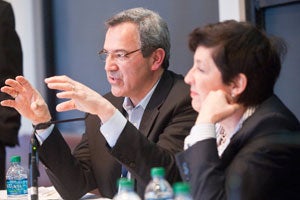This is an important moment for Latino leadership in America, according to Cecilia Muñoz, Director of Intergovernmental Affairs at the White House.
In her lunchtime remarks at the 14th annual Harvard Latino Law, Policy and Business Conference, Muñoz discussed — among other topics — the implications of the 2010 census results for both the Latino community and the country. The census showed that Latinos are now the largest minority group in the country.
“This is an amazing time to be reflecting on leadership, because we’re facing incredible challenges and also amazing opportunities as a community,” she said. “What Latinos want for the country is what every American wants – access to education and healthcare, and the ability for every human to fulfill his or her potential. But the difference now is that we’re in the position to be the agents of change that get us there, now that we’re the largest minority in America.”
The theme of the conference this year, which took place on April 2, was Latino Leadership in the U.S. It addressed the obstacles that Latinos face in attaining positions of power, and highlighted the personal success stories of prominent Latino leaders and of individuals who have led efforts to increase Latino leadership in government, law, and business. The conference was hosted jointly by student groups at Harvard Law School, Harvard Kennedy School and Harvard Business School.
The panelists on the “Personal Reflections on Leadership” panel offered their opinions on the status of Latino leadership in America, focusing on the challenges unique to Latino leaders and the key turning points in their own personal paths to leadership.
Aida Alvarez, Administrator of the Small Business Administration in the Clinton Administration, stressed the importance of electing more Latino political leaders.
“I would love to see a Latino President of the United States but I think it is critically important to not have only one Latino leader, because if we have one Latino leader, it means we have one issue. And if we’re only defining ourselves by one issue, a lot has been left unaddressed, and we become a unidimensional people,” she said.
Edith Ramirez, Commissioner of the Federal Trade Commission, noted that, while large-scale change like political leadership has come slowly and is still very much needed, incremental change is important as well. She encouraged audience members to make an effort to change simply whatever institution they currently find themselves in, which can come through mentorship. She recognized that, as Commissioner of the FTC, she’s able to shape both the institution where she is, and also larger policy issues as well.
“Now that I’m fortunate enough to be at the FTC and in a position where I can impact policy, when it comes to consumer protection issues, my background allows me to understand the systemic inequalities in this country that we need to be aware of,” she said.
Louis Caldera, Vice President of Programs at the Jack Kent Cooke Foundation, had a somewhat gloomier outlook, pointing out the disproportionately small number of Latinos in leadership positions in corporations, foundations, and universities.
“I’m the realist in the crowd,” he said. “So I’m going to tell you that the state of Latino leadership is abysmal, and it will take a lot of work to change that. There will be a lot of risk to the country if we don’t get it right.”
In contrast, David Waller, Senior Partner at Bain & Co., Boston, remarked upon the growth of Latino leadership he has observed in the business community. Twelve years ago, none of Bain’s office heads were Latino, whereas more than twenty percent are today.
“I see progress and am actually inspired by what I see…And I can tell you that the folks who have those roles have gotten there not because they’re Latino, but because they’re terrific at business and just happen to be Latino. To achieve, we have to set high standards and shouldn’t be afraid to push to make that happen,” he said. “The goal needs to be not only to make this growth sustaining, but to make it bigger and better in the years to come.”
The second panel, “Addressing Latino Leadership Challenges Systemically,” included Judith Canales, Administrator of Rural Business and Cooperative Programs at the U.S. Department of Agriculture; Elizabeth Montoya, Chief of Staff and Director of External Affairs at the U.S. Office of Personnel Management; and Ambassador Jose Villarreal, United States of America Commissioner General, World Expo 2010 Shanghai.
Remarks were also given by Solomon Trujillo, former CEO of Telstra; Mark Hugo Lopez of the Pew Hispanic Center; and Roberto Ramirez, Partner at MirRam Group LLC and former New York State Assemblyman.
